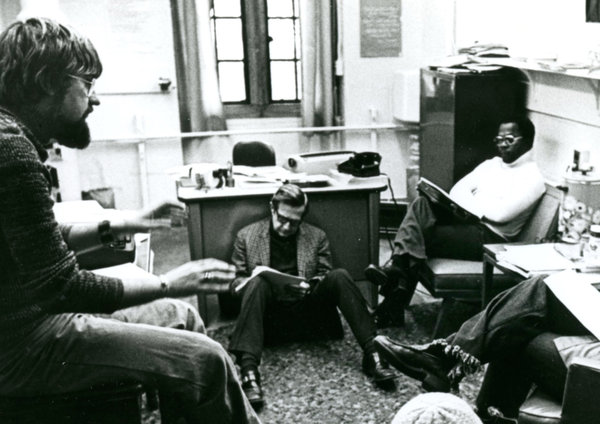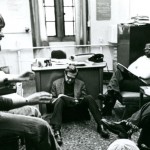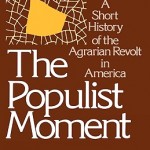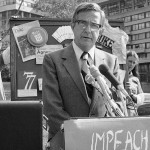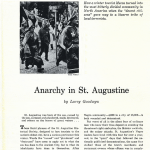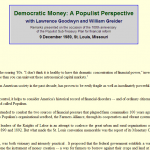Dr. Lawrence Goodwyn, distinguished professor of history at Duke University, taught at Duke from 1971 until his retirement in 2003. He recently passed away in Durham, North Carolina, on September 29, 2013. In a collaborative media portal, his life and work are highlighted by family, friends, and colleagues.
Goodwyn Experiences St. Augustine, FLA: An Oral History
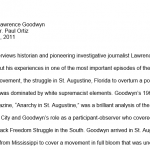 Paul Ortiz interviews historian and pioneering investigative journalist Lawrence Goodwyn about his experiences in one of the most important episodes of the modern Civil Rights Movement, the struggle in St. Augustine, Florida to overturn a power structure that was dominated by white supremacist elements. Goodwyn’s 1965 article in Harper’s Magazine, “Anarchy in St. Augustine,” was a brilliant analysis of the movement in the Ancient City and Goodwyn’s role as a participant-observer who covered the burgeoning Black Freedom Struggle in the South.
Paul Ortiz interviews historian and pioneering investigative journalist Lawrence Goodwyn about his experiences in one of the most important episodes of the modern Civil Rights Movement, the struggle in St. Augustine, Florida to overturn a power structure that was dominated by white supremacist elements. Goodwyn’s 1965 article in Harper’s Magazine, “Anarchy in St. Augustine,” was a brilliant analysis of the movement in the Ancient City and Goodwyn’s role as a participant-observer who covered the burgeoning Black Freedom Struggle in the South.
Goodwyn arrived in St. Augustine in 1964 straight from Mississippi to cover a movement in full bloom that was under severe and violent assault by white supremacists, as recorded in the oral history AAHP-177 with Dr. Lawrence Goodwyn. In this recollection, recorded nearly a half-century after his Harper’s essay Goodwyn describes how the St. Augustine police allowed members of the Ku Klux Klan, operating as the Ancient City Gun Club, in an area to beat Civil Rights marchers. A student of the American Civil War, Goodwyn was startled to hear whites shout the ‘Rebel Yell’ as they charged down on the marchers.
What follows is a discussion with one of America’s foremost historians of democracy about the fragility of memory, the heroism of civil rights activists and the persistence of white supremacy in American life. Goodwyn also ruminates on the enduring power of the Civil War on American culture & the role of William Faulkner as interrogator of the haunted landscape of social relations in the American South. He concludes with a discussion of President Barack Obama, the idea of the “post-racial society,” and a life-changing discussion with his father, a military officer about the legacy of General Robert E. Lee.
From Florida Memory,
A video of race riots in St. Augustine in 1964
Read more about the :
St. Augustine civil rights demonstrations
“Anarchy in St. Augustine,” Harper’s Weekly June 1965
Lawrence Goodwyn published a remembrance and historical analysis of his experience in St. Augustine with civil rights activists and their opponents in a famous Harper’s Weekly article, “Anarchy in St. Augustine,” in June 1965. The full text is available on Harper’s website, as are scans of the original publication.
“Democratic Money: A Populist Perspective” with Lawrence Goodwyn and William Greider
William Greider and Lawrence Goodwyn presented marks in St. Louis, Missouri, at the hundredth anniversary of the Populist Sub-Treasury Plan for financial reform, “Democratic Money: A Populist Perspective.” The remarks are archived online at ratical.org, the electronic manifestation of rat haus reality press.
Greider’s memorial, Remembering Larry Goodwyn, was published in The Nation in October.
“The Democratic Revolution” by Lawrence Goodwyn in First of the Month
After studying social movements for more than 30 years, Lawrence Goodwyn reflected in “The Democratic Revolution” with First of the Month on this historical problems of networking, coalition building, and the gap between popular assessments of politics and the reality of negotiating, noting, “Maybe [a meeting of Democrats] should be turned inside out. Perhaps the purpose of such meetings should be to bring together 100 people so they could talk to each other about the organizing problems they face, rather than hear wisdom from a panel.”
Memorials and Remembrances
The New York Times
 Dr. Goodwyn’s obituary, “Lawrence Goodwyn – Historian, Journalist, and Civil Rights Activist – Dies at 85” was published by The New York Times on October 1, 2013, and written by William Yardley.
Dr. Goodwyn’s obituary, “Lawrence Goodwyn – Historian, Journalist, and Civil Rights Activist – Dies at 85” was published by The New York Times on October 1, 2013, and written by William Yardley.
Lawrence Goodwyn’s experience[s] building cross-racial political coalitions in the 1960s led him to write an authoritative history of the rise of American populism in the 19th century…[his] 1976 book, “Democratic Promise: The Populist Moment in America,” became a standard text in colleges and something of a blueprint for activists hoping to harness grass-roots support to force political change.
–NYT
 Duke Today
Duke Today
The daily campus newspaper for Duke University, Duke Today, published an official remembrance for Dr. Goodwyn as the campus flags were lowered in his honor on September 30, 2013, “Duke Flags Lowered.”
Always provocative and challenging, Goodwyn challenged, inspired and transformed the lives of three generations of Duke students, graduates and undergraduates. His legacy lives on with those students and their commitment to the ideals he served so well.
–Duke Today
Texas Observer
 The Texas Observer published a memorial to Goodwyn from Ronnie Dugger, “Lawrence Goodwyn, A Man of Words and Ideals,” on November 7, 2013. Dugger writes about growing up with Goodwyn in Texas, and their lifelong friendship, through Goodwyn’s publication of Democratic Promise: The Populist Moment in America and Breaking the Barrier: The Rise of Solidarity in Poland over his celebrated, controversial career. Goodwyn was also a writer and editor for The Observer.
The Texas Observer published a memorial to Goodwyn from Ronnie Dugger, “Lawrence Goodwyn, A Man of Words and Ideals,” on November 7, 2013. Dugger writes about growing up with Goodwyn in Texas, and their lifelong friendship, through Goodwyn’s publication of Democratic Promise: The Populist Moment in America and Breaking the Barrier: The Rise of Solidarity in Poland over his celebrated, controversial career. Goodwyn was also a writer and editor for The Observer.
“He was a deep, good friend, important to me before I decided what I wanted to do,” Cortes said. Goodwyn helped him to read critically and thoughtfully. While urging Cortes to be sharp and tough for social justice, Goodwyn also told him, “never lose your love of words, your capacity for tenderness, your capacity to care about other people.” Cortes granted that Goodwyn could be irascible, “but I regard that as endearing. I am forever in his debt.”
–Ernesto Cortes in the Texas Observer
The Nation
 William Greider writes in Remembering Larry Goodwyn, published in The Nation on October 23, 2013, about learning from Larry Goodwyn at Duke University, saying, “He gave me the language and the nerve to write seriously about the idea of democracy.”
William Greider writes in Remembering Larry Goodwyn, published in The Nation on October 23, 2013, about learning from Larry Goodwyn at Duke University, saying, “He gave me the language and the nerve to write seriously about the idea of democracy.”
The Goodwyn club for democratic promise is clearly a minority faction for now. Pessimism and resignation are in the saddle. But Larry has always said that faith in the democratic idea requires the long view of history. Even in adversity, it is an accomplishment to keep the idea alive for the next generation. Larry did that surely.
–The Nation
Durham Herald Sun
 Recognizing Dr. Goodwyn’s 32-year contribution to Duke University, and his commitment to developing the college’s Oral History Program, the Durham Herald Sun published an article on his legacy, “Former Duke history professor Lawrence Goodwyn dies,” on October 2, 2013.
Recognizing Dr. Goodwyn’s 32-year contribution to Duke University, and his commitment to developing the college’s Oral History Program, the Durham Herald Sun published an article on his legacy, “Former Duke history professor Lawrence Goodwyn dies,” on October 2, 2013.
The [oral history] program “is changing the whole nature in the way history is written about the civil rights movement,” [Bill] Chafe told The Herald-Sun. It’s about “the importance of understanding the civil rights movement as a bottom-up grassroots movement, not something that was top-down.”
–Durham Herald Sun
